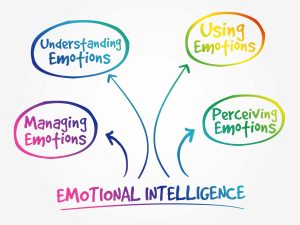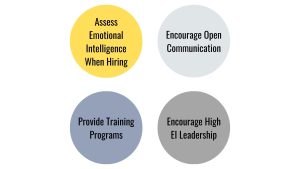Emotional Intelligence in Team Augmentation
Introduction In the world of team augmentation, success depends on more than just technical expertise. Emotional intelligence (EI) plays a key role in ensuring seamless integr...

Introduction
In the world of team augmentation, success depends on more than just technical expertise. Emotional intelligence (EI) plays a key role in ensuring seamless integration, effective collaboration, and long-term project success. While technical skills can be the foundation of any team, EI strengthens the bonds that bind teams together.
Let’s look at Emotional Intelligence in team augmentation, why it’s important, and how organisations can encourage it.
Understanding Emotional Intelligence in Team Augmentation
Emotional intelligence refers to the ability to recognise, understand, and manage emotions in yourself and others. It encompasses five core components:
- Self-awareness: understanding your own emotions.
- Self-regulation: controlling impulsive reactions.
- Motivation: maintaining a positive drive to achieve goals.
- Empathy: understanding the emotions of others.
- Social skills: building and maintaining strong interpersonal relationships.
In augmented teams, where people often come from different cultural and professional backgrounds, these skills become invaluable. They help create an environment where external talent can integrate smoothly.

Why Emotional Intelligence in Team Augmentation Matters
1. Improved Collaboration
Augmented teams often combine internal and external talent. Without emotional intelligence, misunderstandings can arise due to differences in work styles or communication habits. Team members with high EI can easily navigate these differences. For example, they can read nonverbal cues, adapt their approach, and find common ground. This promotes collaboration and minimizes conflict.
2. Build Trust Quickly
Trust is the foundation of any successful team. For extended teams, establishing trust can be challenging due to limited time and unfamiliarity. Leaders and members with high EI are better at demonstrating empathy and authenticity. They can create a sense of psychological safety in which team members feel valued and respected.
3. Improved Adaptability
The dynamics of augmented teams are constantly changing. Emotional intelligence in team augmentation gives people the resilience needed to adapt to changing priorities or new team structures. Self-regulation, in particular, helps team members stay focused in stressful situations, ensuring high productivity and morale.
4. Strengthening Communication
Clear communication is crucial to strengthening a team. Emotional intelligence enhances it by ensuring that messages are delivered thoughtfully and received with understanding. Empathy plays a major role here, helping people tailor their communication to the listener’s perspective.

How Organisations Can Foster Emotional Intelligence in Team Augmentation
While technical skills are often the focus of recruiting, emotional intelligence should not be overlooked. Here are practical ways organisations can make EI a priority:
1. Assess Emotional Intelligence When Hiring
During interviews, assess EI by asking situational questions. For example, “Can you describe a time when you had to resolve a conflict at work?” This will show how candidates manage emotions and interact with others.
2. Provide Training Programs
Organisations can develop EI through targeted training programs. Workshops on active listening, stress management, and empathy can improve these skills across the entire team. Investing in EI training pays off as it strengthens the overall team dynamic.
3. Encourage Open Communication
Create a culture where team members feel comfortable expressing themselves. Regular check-ins, feedback sessions, and open forums can help team members develop their emotional intelligence while fostering a positive work environment.
4. Encourage High EI Leadership
Leaders set the tone for the entire team. By promoting leaders with strong emotional intelligence, organisations can ensure that teams feel supported and understood. Such leaders inspire confidence, encourage collaboration, and manage conflict effectively.

Real-Life Examples of Emotional Intelligence in Team Augmentation
Example 1: Seamless Integration
A software company expanded its internal team with external developers for a high-stakes project. At first, both sides were hesitant. However, the project manager, known for her high emotional intelligence, prioritised relationship building. Through regular one-on-one meetings and team-building activities, trust grew. Ultimately, the team completed the project ahead of schedule.
Example 2: Conflict Management
An expanded marketing team was confronted with disagreements over creative direction. Rather than allowing tensions to escalate, the team leader used empathy to understand each side’s perspective. By facilitating constructive dialogue, the team reached a consensus that satisfied everyone. The project moved smoothly, thanks to the manager’s emotional intelligence.
Future of Emotional Intelligence in Team Augmentation
As the workplace evolves, emotional intelligence will become increasingly important. Remote work and cross-cultural collaboration are now the norm. These trends require teams to be more aware and adaptive. By prioritising EI, organisations can prepare their team expansion strategies for the future.
What’s more, technology is unlikely to replace the human touch that EI provides. While AI can process data and predict outcomes, it cannot replicate the empathy and nuanced understanding required in human interactions.
Conclusion
Emotional intelligence is the hidden glue that holds successful augmented teams together. Beyond technical skills, it enables collaboration, trust, and adaptability across a variety of settings. By investing in EI, organisations not only improve team performance, but also create a more harmonious and productive workplace.
When planning your next team augmentation strategy, remember to look beyond the resume. Assess how well candidates understand and manage emotions. After all, in a rapidly changing work landscape, emotional intelligence is a competitive advantage that no team can afford to overlook.